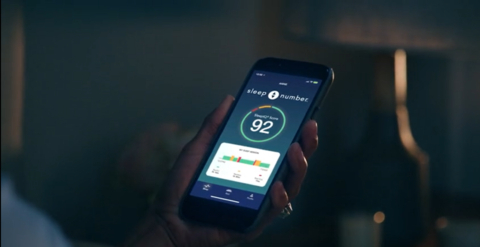New Study Shows Potential of Sleep Number 360® Smart Bed as a Trusted Device for Capturing Reliable Sleep Data from Home
The study, published in Sensors, shows sleep metrics measured by Sleep Number’s SleepIQ® technology and polysomnography (PSG) were strongly correlated
Results suggest the 360 smart bed may provide reliable measurements of sleep quality and access to sleep metrics in a large population for longer periods of time than what is currently feasible with PSG

SleepIQ® technology, the operating system of the
“This is an important step in validating the 360 smart bed for use in sleep research and is foundational to our purpose of improving the health and wellbeing of society through higher quality sleep,” said
SleepIQ technology is embedded into every 360 smart bed. Its proprietary, dynamic algorithm gathers billions of longitudinal biosignal and sleep data points from millions of real-world sleepers. The smart bed’s sensors unobtrusively measure average heart rate and breathing rate, motion, temperature and more, allowing the bed to learn and evolve with each sleeper. Using an embedded ballistocardiograph (BCG), signal processing and machine learning, the smart bed provides real-time measurement of several sleep metrics, including duration and quality. The sensors help to create a responsive and adjustable microenvironment for each individual and can effortlessly respond to a sleeper to keep them comfortable.
This study performed three analyses in evaluating sleep metrics measured by SleepIQ technology against PSG: the ability to measure all-night heart rate and breathing rate; the sensitivity of the smart bed for detecting sleep and specificity to detect wake stages; and the measurement of all-night summary metrics including sleep efficiency, sleep onset latency, total sleep time and wake after sleep onset. The study included 45 participants aged 22-64 who slept one night in a laboratory setting and underwent simultaneous PSG and SleepIQ recordings.
While PSG has traditionally been considered the gold standard for measuring sleep, it has its limitations. Because it is generally collected in a lab, information gathered by PSG may not reliably translate to real-life conditions. Although its use in longitudinally monitoring sleep in real-life conditions is possible, it is expensive, time consuming, discontinuous, and imposes a high burden on the sleeper. The 360 smart beds stand out not only because the embedded SleepIQ technology provides accurate, ecologically valid data collection, but because they are effortless to use - with no need to wear or charge anything - making them the first smart bed that requires no user action to monitor biosignals and automatically adjusts to improve sleep. The SleepIQ data gathered from the 360 smart beds also enables the collection of sleep metrics in large populations for longer periods of time than is feasible with PSG.
“We’re excited by the potential of this research and our technology to develop new products, services and impactful partnerships,” said
“We know sleepers have long questioned the reliability of the heath data they receive from their devices,” said
Results of the study showed measurements of both epoch-by-epoch and mean heart and breathing rates were strongly correlated between SleepIQ technology and PSG. In addition, SleepIQ technology was able to differentiate sleep and wake states with reasonable accuracy and precision, with a higher sensitivity in detecting sleep and a lower specificity in detecting wake states. For all-night sleep metrics, SleepIQ technology showed reasonable accuracy in measuring sleep onset latency, wake after sleep onset, sleep efficiency and total sleep time. Importantly, the accuracy of these measurements was impacted by the amount of time participants were awake in bed, with results showing greater accuracy for participants who spent less time awake. Future studies are needed to better characterize the accuracy of the smart bed, with particular regard to longitudinal repeatability and reliability, using data collected over multiple nights for each participant. Further validation is also required to assess the smart bed as a potential screening tool for sleep disorders.
“Performance Evaluation of a Smart Bed Technology against Polysomnography” is now available here: https://www.mdpi.com/1424-8220/22/7/2605. To learn more about our innovations in sleep health, science and research, visit: www.sleepnumber.com/science.
*Based on average SleepIQ® data from
About
Individuality is the foundation of
Our award-winning 360® smart beds are informed by science. They learn from over one billion sleep sessions of highly-accurate, real world sleep data – the culmination of 14 billion hours’ worth - to automatically adjust to each sleeper and provide effortless comfort and proven quality sleep. Our 360 smart beds deliver individualized sleep health reports and insights, including a daily SleepIQ® score, and are helping to advance meaningful sleep health solutions by applying sleep science and research.
For life-changing sleep, visit SleepNumber.com or one of our 650
Forward-looking Statements
Statements used in this news release relating to future plans, events, or performance such as plans to provide a reliable, longitudinal measurement of sleep quality are forward-looking statements subject to certain risks and uncertainties. Additional information concerning these and other risks and uncertainties is contained in the company’s filings with the
View source version on businesswire.com: https://www.businesswire.com/news/home/20220519005452/en/
Sleep Number Public Relations
Julie.Elepano@sleepnumber.com
Sleep Number Public Relations
Nichole.Teixeira@sleepnumber.com
Source:







